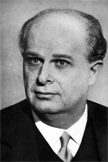Adriano Olivetti
Adriano Olivetti
Born April 11, 1901, Ivrea, Italy; died February 27, 1960, Aigle, Switzerland; Italian manufacturer of Olivetti typewriters, calculators, and computers.

Education: degree in industrial chemical engineering, Turin Polytechnic, 1924.
Professional Experience: Olivetti Company: factory hand, 1924-1925, general manager, 1933-1938, chairman, 1938-1960.
Honors and Awards: Compasso d'Oro, 1955; Architecture Prize, Cercle d'Etudes Architecturelles (Paris), 1956; Edward 0. Seits Memorial Award, National Association of Foremen, 1957; honorary doctorate in political and social science, University of Florence, 1962 (posthumous).
Olivetti was an entrepreneur and innovator who transformed shop-like operations into a modern factory. In and out of the factory, he both practiced and preached the utopian system of the "community movement," but he was not an astute enough politician to have a mass following.
The Olivetti empire was begun by his father Camillo, an Italian of Spanish origin; his ancestors, escaping the Inquisition, arrived in Turin in around 1600. Initially the "factory" (30 workers) concentrated on electric measurement devices. By 1908 (25 years after Remington in the US) Olivetti started to produce typewriters.
Camillo, an engineer and innovator, believed that his children could get a better education at home. Adriano's formative years were spent under the tutelage of his mother, an educated and sober woman. Also, as a socialist, Camillo emphasized the non-differentiation between manual and intellectual work. His children, during their time away from study, worked with and under the same conditions as his workers. The discipline and sobriety Camillo imposed on his family induced rebellion in Adriano's adolescence, manifested by a dislike of "his father's" workplace and by his studying at a polytechnic school subjects other than the mechanical engineering that his father wanted.
Nevertheless, after graduation in 1924, he joined the company for a short while. When he became undesirable to Mussolini's Fascist regime, Camillo sent Adriano to the US to learn the roots of American industrial power. For the same reasons he later went to England. Upon his return he married Paolo Levi, a sister of a good friend, a marriage that produced three children but did not last long.
His visit to the US at various plants and especially at Remington convinced Adriano that productivity is a function of the organizational system. With the approval of Camillo, Adriano organized the production system at Olivetti on a quasi-Taylorian mode and transformed the shop into a factory with departments and divisions. Possibly as a result of this reorganization, output per man-hour doubled within five years. Olivetti, for the first time, sold half of the typewriters used in Italy in 1933. Adriano Olivetti shared with his workers the productivity gains, by increasing salaries, fringe benefits, and services.
His success in business did not diminish his idealism. In the 1930s he developed an interest in architecture, as well as urban and community planning. He supervised a housing plan for the workers at Ivrea (a suburb of Turin, where the Olivetti plant is still located) and a zoning proposal for the adjacent Valle d'Aosta. Under Fascism, patronizing workers at work and at home was in line with the corporative design of the regime. While Adriano showed distaste for the regime, he joined the Fascist Party and became a Catholic. Yet during World War II he participated in the underground anti-Fascist movement, was jailed, and at the end sought refuge in Switzerland. There he was in close contact with intellectual émigrés, and he was able to develop further his socio-philosophy of the community movement.
During the immediate postwar years, the Olivetti empire expanded rapidly, only to be briefly on the verge of bankruptcy after the acquisition of Underwood in the late 1950s. During this period, first calculators and then computers replaced typewriters as the prime production focus. Adriano shared his time between business pursuits and attempts to practice and spread the utopian ideal of community life. His belief was that people who respect each other, and the environment, can avoid war and poverty.
In his enterprises, Adriano Olivetti's attempts at utopia translated in practice as actions of an enlightened boss or a form of corporatism. He decreased the hours of work and increased the salaries and fringe benefits. By 1957 Olivetti workers were the best paid of all in the metallurgical industry, and Olivetti workers showed the highest productivity. His corporatism also succeeded in having his workers accept a company union not tied to the powerful national metallurgical trade unions.
During the 1950s, in a limited way, the community movement succeeded politically in Ivrea. But the utopia at the factory and in Italy at large began withering away even before Adriano's death in 1960. [Based on documents provided by Olivetti Research, Ltd.]
BIBLIOGRAPHY
Biographical
Anon., "Adriano Olivetti," Time, New York, Feb. 8, 1954.
Kent, George, "The Man Who Saves Villages," Reader's Digest, New York, Jan. 1957.
Significant Publications
Olivetti, Adriano, "Reflections on the Management of Complex Mass Production Industry," Technica ed Organizzione, No. 3, Ivrea, Italy, May 1937.
UPDATES
Portrait added (MRW, 2013)
New content Copyright © 2013-2023 by the IEEE Computer Society and the Institute of Electrical and Electronics Engineers Inc.
All rights reserved. This material may not be reproduced or redistributed without the express written permission of the copyright holder.
